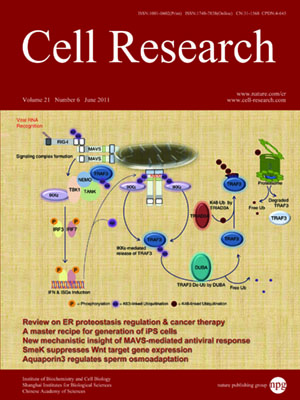
Volume 21, No 6, Jun 2011
ISSN: 1001-0602
EISSN: 1748-7838 2018
impact factor 17.848*
(Clarivate Analytics, 2019)
Volume 21 Issue 6, June 2011: 911-921
ORIGINAL ARTICLES
Smek promotes histone deacetylation to suppress transcription of Wnt target gene brachyury in pluripotent embryonic stem cells
Jungmook Lyu1,2, Eek-hoon Jho3 and Wange Lu1,2
1The Eli and Edythe Broad Center for Regenerative Medicine and Stem Cell Research, University of Southern California, Keck School of Medicine, Los Angeles, CA 90033, USA
2Department of Biochemistry and Molecular Biology, University of Southern California, Keck School of Medicine, Los Angeles, CA 90033, USA
3Department of Life Science, University of Seoul, Seoul 130-743, Korea
Correspondence: Wange Lu, Jungmook Lyu,(wangelu@usc.edu; jungmool@usc.edu)
In embryonic stem cells (ESCs), Wnt-responsive development-related genes are silenced to maintain pluripotency and their expression is activated during differentiation. Acetylation of histones by histone acetyltransferases stimulates transcription, whereas deacetylation of histones by HDACs is correlated with transcriptional repression. Although Wnt-mediated gene transcription has been intimately linked to the acetylation or deacetylation of histones, how Wnt signaling regulates this type of histone modification is poorly understood. Here, we report that Smek, a regulatory subunit of protein phosphatase 4 (PP4) complex, plays an important role in histone deacetylation and silencing of the Wnt-responsive gene, brachyury, in ESCs. Smek mediates recruitment of PP4c and HDAC1 to the Tcf/Lef binding site of the brachyury promoter and inhibits brachyury expression in ESCs. Activation of Wnt signaling during differentiation causes disruption of the Smek/PP4c/HDAC1 complex, resulting in an increase in histones H3 and H4 acetylation at the brachyury gene locus. These results suggest that the Smek-containing PP4 complex represses transcription of Wnt-responsive development-related genes through histone deacetylation, and that this complex is essential for ESC pluripotency maintenance.
Cell Research (2011) 21:911-921. doi:10.1038/cr.2011.47; published online 22 March 2011
FULL TEXT | PDF
Browse 2205


